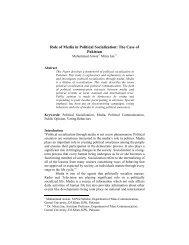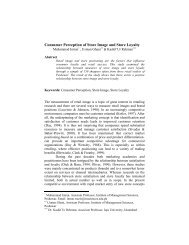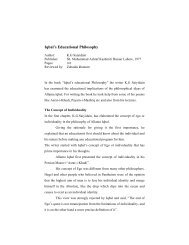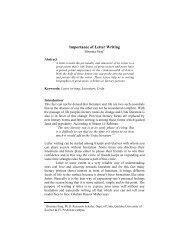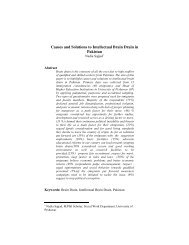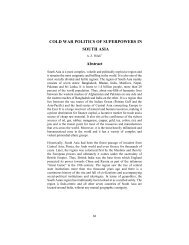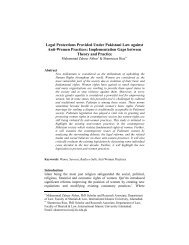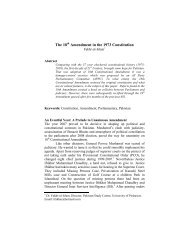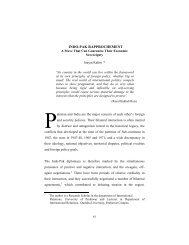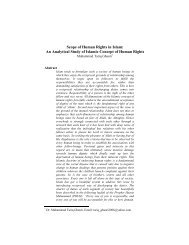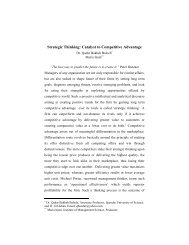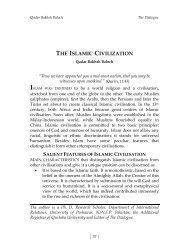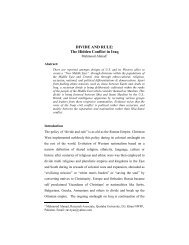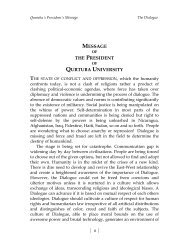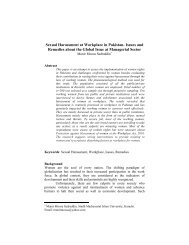Iqbal and Quaid's Vision of Pakistan - Qurtuba University of Science ...
Iqbal and Quaid's Vision of Pakistan - Qurtuba University of Science ...
Iqbal and Quaid's Vision of Pakistan - Qurtuba University of Science ...
You also want an ePaper? Increase the reach of your titles
YUMPU automatically turns print PDFs into web optimized ePapers that Google loves.
<strong>Iqbal</strong> <strong>and</strong> Quaid’s <strong>Vision</strong> <strong>of</strong> <strong>Pakistan</strong> Zamir Akhtar Khan<br />
retain <strong>Pakistan</strong>.” 62 [Be a Muslim. Transcend all sorts <strong>of</strong><br />
Sects <strong>and</strong> Sectarianism]<br />
“For us <strong>Pakistan</strong> means our defence, our deliverance,<br />
<strong>and</strong> our destiny. It is the only way which will ensure to<br />
us our freedom <strong>and</strong> the maintenance <strong>of</strong> our honour <strong>and</strong><br />
the glory <strong>of</strong> Islam.” 63<br />
<strong>Iqbal</strong> <strong>and</strong> Quaid’s views formulated ideology <strong>of</strong> <strong>Pakistan</strong><br />
If we analyze <strong>Iqbal</strong> & <strong>Quaid's</strong> views expressed by them during the entire<br />
struggle for <strong>Pakistan</strong> it is nothing but Islam which they wanted to see as<br />
the system <strong>of</strong> life to be implemented in <strong>Pakistan</strong> .It is for Muslims to<br />
stick to the vision <strong>of</strong> these two heroes who have left a great legacy in the<br />
form <strong>of</strong> rich ideas derived from the heavenly sources i.e. the Qu'ran <strong>and</strong><br />
the Sunnah.<br />
Following is the summary <strong>of</strong> <strong>Pakistan</strong> Ideology extracted from<br />
Sharif al Mujahid's book titled "Ideology <strong>of</strong> <strong>Pakistan</strong>":<br />
"The paramount significance <strong>of</strong> <strong>Pakistan</strong>, however, lay in the fact that it<br />
was premised on a philosophy which boldly challenged the prevalent<br />
notions <strong>of</strong> statehood, especially that states ought to be formed on the<br />
basis <strong>of</strong> territorial nationality. The <strong>Pakistan</strong> movement seemed to be a<br />
brave act <strong>of</strong> swimming against the ideological currents <strong>of</strong> the time. The<br />
whole point <strong>of</strong> the <strong>Pakistan</strong> idea was that the prevalent concept <strong>of</strong> the<br />
collective identity <strong>of</strong> Indian Muslims.<br />
It had become quite clear by the early forties that Islam was<br />
functioning in India as the major bond <strong>of</strong> cohesion for its followers. The<br />
separate nationhood <strong>of</strong> Indian Muslims was eventually recognized <strong>and</strong> so<br />
there came into existence in August 1947 a state in the name <strong>of</strong> Islam.<br />
What was quite novel about this state was that its declared objective was<br />
to translate Islam’s ideals into [terms <strong>of</strong>] practice. The birth <strong>of</strong> <strong>Pakistan</strong><br />
was also perceived as a major stride towards the unity <strong>of</strong> the Muslims <strong>of</strong><br />
the world, something that would give Muslims the enhanced weight <strong>and</strong><br />
strength needed to preserve the substance <strong>of</strong> their independence. This<br />
unity was seen necessary to enable Muslims to act in the international<br />
sphere for the greater good <strong>of</strong> the Ummah <strong>and</strong> to make their contribution<br />
to building a better order for all humanity, an order based on justice,<br />
universal brotherhood <strong>and</strong> well-being <strong>of</strong> all, especially <strong>of</strong> the<br />
downtrodden, the “wretched <strong>of</strong> the earth”. But above all, many Muslims<br />
envisioned that the new country would serve, in the words <strong>of</strong> Quaid-i-<br />
Azam Muhammad Ali Jinnah <strong>and</strong> Liaquat Ali Khan, the first Prime<br />
Minister <strong>of</strong> <strong>Pakistan</strong>, as a laboratory wherein Islamic principles would be<br />
tested <strong>and</strong> shown to be wholesome for all humanity.<br />
The Dialogue 156<br />
Volume V Number 2



